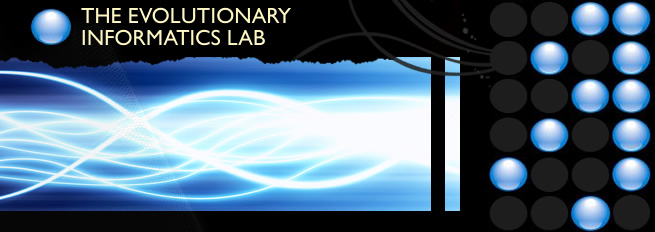Projects
Donate
Fund ResearchQuote
— David Wolpert and William G. Macready "No free lunch theorems for optimization", IEEE Trans. Evol. Comp. 1(1) (1997): 67-82.The inability of any evolutionary search procedure to perform better than average indicate[s] the importance of incorporating problem-specific knowledge into the behavior of the [search] algorithm.
Frequently Asked Questions
-
General
What is the Evolutionary Informatics Lab?Have you disproved evolution?We are a group of STEM (science/technology/engineer/math) professionals who focus on the role of information in the modeling and analysis of evolutionary processes and related phenomena.
Is your website the one mentioned in the movie Expelled: No Intelligence Allowed?No. Evolution, when defined as biological change over time, is undeniable. Dogs can be bred and bacteria strains develop immunity to antibiotics. Our work focuses not on whether evolution happened but rather on the informational requirements of evolution. Conservation of Information theorems show that evolutionary processes by themselves are not capable of internally generating the information needed for their success and must instead draw on a source of external information to succeed. If Darwinists don't add a full measure of active information to their primordial soup, it won't cook.
Yes, the Evolutionary Informatics Lab was formerly a research initiative at Baylor University. In the fall of 2007, after its work was publicly identified as friendly to intelligent design, the Baylor administration removed any reference to the Lab from its server. This is the same website moved to an external server.
Robert J. Marks II, the subject in Expelled, continues his position at Baylor as a tenured Distinguished Professor. The Baylor President during the Expelled incident was subsequently fired by Baylor's Board of Regents. Marks continues to work in evolutionary informatics under a new Baylor administration that, thus far, has neither endorsed nor interferred with his research. Marks is enthusiastically supportive of Baylor's Christian mission. (All three of his children are Baylor graduates.)
PRESUPPOSITIONS
Are you Christians?Do you hold to intelligent design?Yes. Though not a requirement for affiliation and though we welcome non-Christians, all current members of the EIL are, to our knowledge, Christians.
Do your presuppositions compromise your objectivity?A proponent of intelligent design holds that various features of the universe could not have occurred merely by a combination of chance and necessity and instead requires application of external information. Evidence, we contend, strongly supports this viewpoint.
Why should the scientific validity of the EIL's work be taken any more seriously than the scientific validity of astrology, geocentricity, or a flat earth?All STEM professionals, wherever they stand on evolution, bring their presuppositions to the table. In the dark room of undiscovered truth, presuppositions direct their owners on where to shine a light. The validity of the revealed truth, vetted by time and objective scrutiny, is unaffected.
The scientific validity of astrology and the like have long been discredited on empirical and theoretical grounds. Modeling evolution, in light of new results in epigenetics, evolutionary convergence, and our work in evolutionary informatics, represents cutting-edge research.
CONTROVERSY
Why don't you respond to all the blog criticisms of your work?The No Free Lunch Theorems only apply when taking the average of all fitness functions. A search only has to work on a single fitness function, and thus the No Free Lunch Theorems are irrelevant.Some critiques of the EIL's work in blogs have been insightful and we have responded to them. In some cases we have published errata citing the individuals who discovered errors in our work. In no case thus far have these errors diminished the primary conclusions of our work.
There are also other blogger ideologues who are religiously dedicated to discrediting our work independent of its content. Our policy is not to feed their blogs with responses to their queries.
Other blog criticisms of our work are ill-conceived. The attacks tend to fall into three categories. Some are personal attacks, which we have ignored. Some are complaints about minor issues which do not affect the overall argument of the paper. These are often also inaccurate. Some are attempts to show our mathematical results wrong but are external to or misrepresent our results.The best venue for critical analysis of any work is the literature.
Conservation of Information theorems show that information cannot be extracted from fitness functions, yet you claim that a search algorithm succeeds by exploiting information extracted from fitness functions.The average result of buying a lottery ticket is that you are out the cost of the ticket. Consequently, playing the lottery is a bad strategy for making money. The fact that you only buy a single ticket does not invalidate this result. A successful search is like a winning lottery ticket, having one either means you are very lucky or there is some other explanation.
Conservation of Information theorems show that, in the absence of knowledge of the problems faced, you cannot expect better than random performance, not that you cannot achieve better than random performance. Yet you seem to be saying the latter.The No Free Lunch theorem applies to an average across all fitness functions. An individual fitness function (or set of fitness functions) may very well have exploitable information. The success of a search algorithm is usually due to exploiting the particular properties of the fitness functions on which it runs.
Realistic fitness functions are not uniformly distributed; rather the distribution of fitness functions for real world problems is suited towards evolutionary mechanisms. Your work seems to ignore this fact.Certainly, it is possible to have better than random performance because of a lucky choice of algorithm. But for an algorithm to repeatedly solve many different problems requires that it be correlated in some way with the problems it has to solve.
Active Information merely describes the performance of search algorithms, so calling it information is a misnomer.Given the success of evolutionary search algorithms, there are two possibilities. Either realistic problems are naturally well suited to an evolutionary search algorithm, or human intelligence is responsible for adapting the search algorithm and fitness function into a successful search. We've shown in all the simulations that we have investigated that the search has been adapted and tweaked in order to succeed, suggesting that the problem was not naturally suited to an evolutionary search.
You seem to be challenging evolution generally by arguing that a large quantity of active information in an evolutionary search invalidates it.Successful performance of a search algorithm results from the search along with the problem it is intended to solve being well-matched. The degree of such matching is readily measured as the information that the search has about the problem it solves. The term active information is therefore appropriate. And, inarguably, the negative log of probability is a commonly used definition of information.
Your argument is nothing but a god of the gaps argument. It is not scientific.The requirement of enormous amounts of active information does indeed caste grave doubts on the validity of undirected Darwinian evolution. The presence of active information must be explained. In the cases of the models we have investigated, the active information mostly derives from the exploitation of the model designer's prior knowledge. Without an explanation for this active information, Darwinian evolution does not explain biological life, and any form of evolution capable of explaining life must be a teleological process.
The solar system could not exist without a massive object for the planets to orbit. Pointing out this fact is not a sun-of-the-gaps argument. Evolutionary processes do not work without information sources, pointing out this necessity is not a god-of-the-gaps argument. Information is mathematically necessary, the philosophical or religious position that one takes as to the origin of that information is a separate issue.




